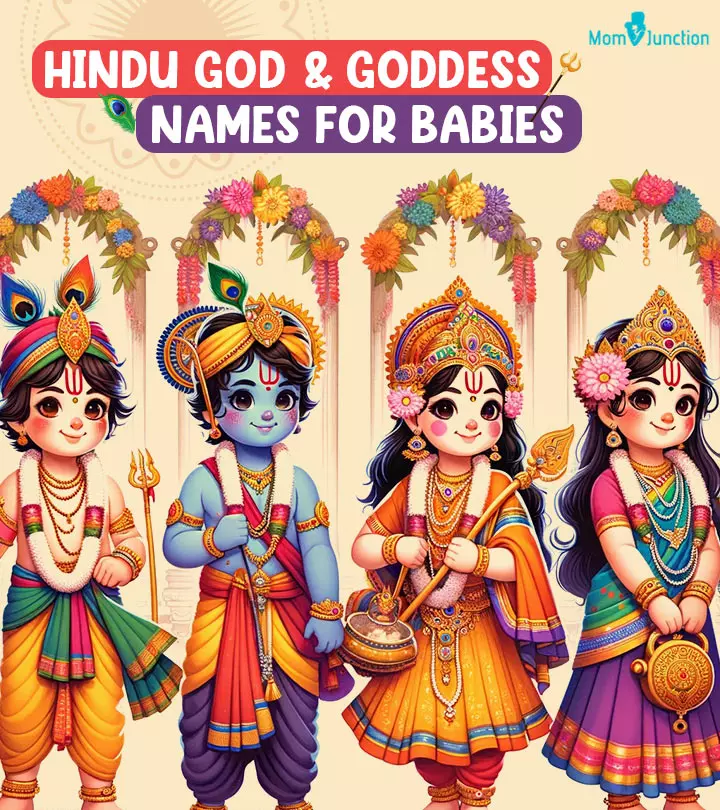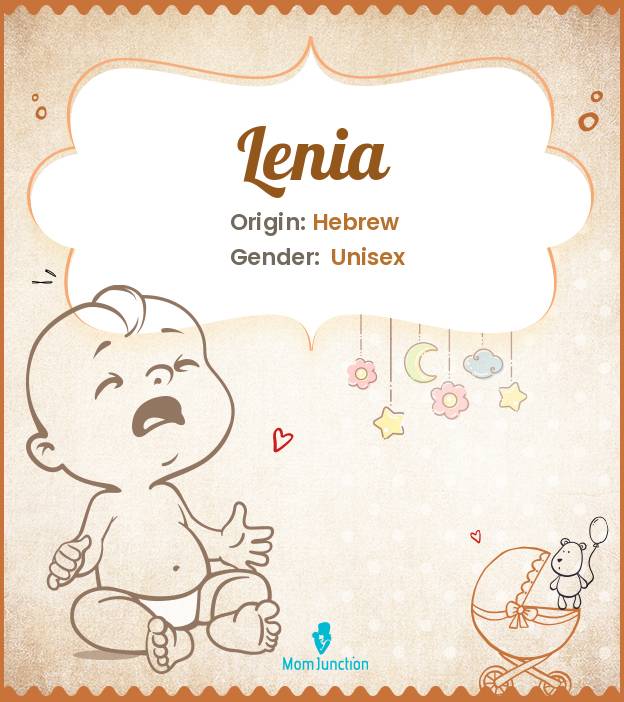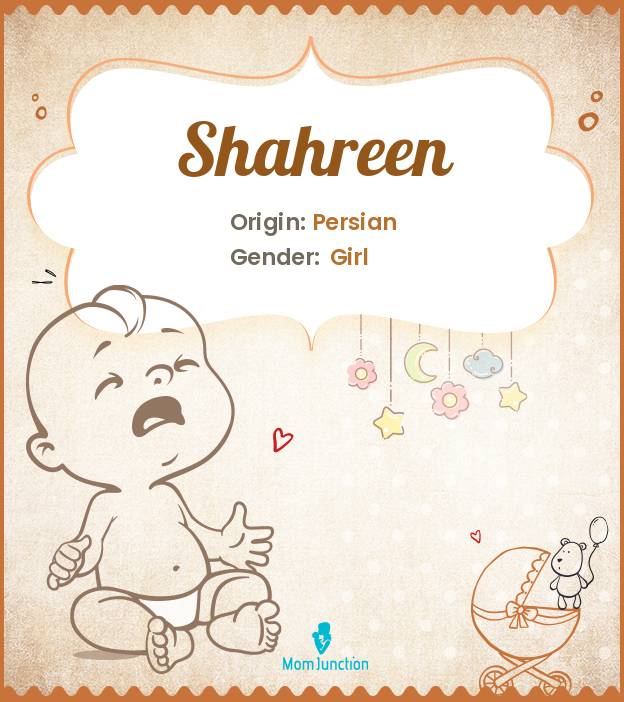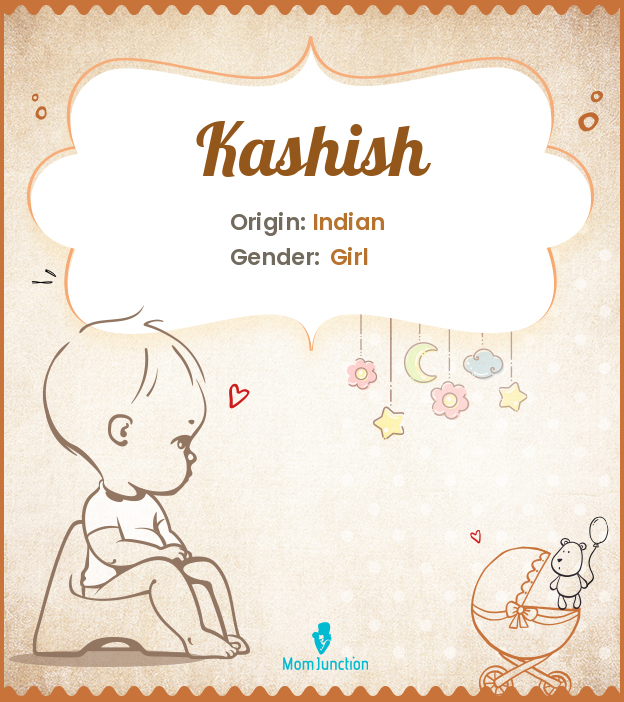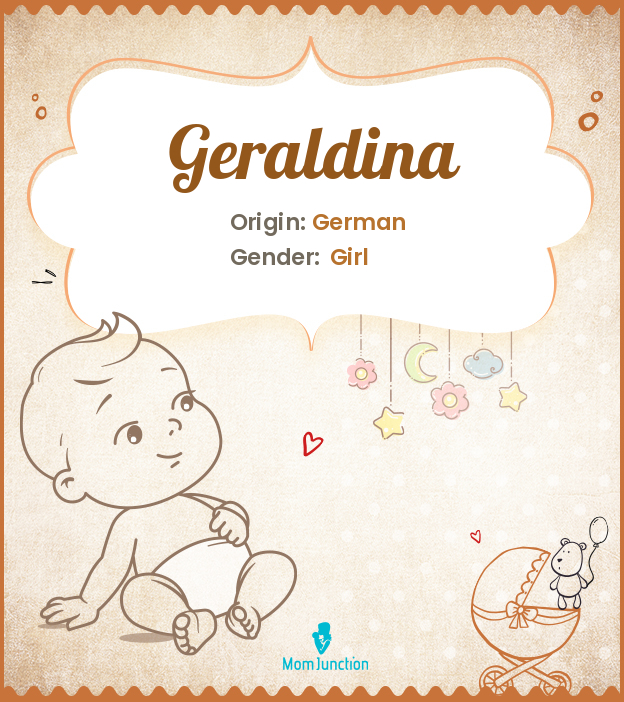
Image: Momjunction Design Team

Located in Central Europe, Austria is a land known for its rich cultural heritage and stunning landscapes. Austrian surnames are a reflection of not just their heritage but also their familial lineages, occupations, and geographical locations. Being at the crossroads of Europe, the surnames are heavily influenced by German and Latin languages. However, Austrians are ethnically Germans, and so is the official language of the country (1). Since the majority of Austrians speak German, most of their surnames have German origins.
Understanding the origins of these surnames connects us to our past and enriches our cultural identity. Each surname carries a story that reflects the history, geography, and professions of those who came before us. In this post, we explore top Austrian surnames or last names with meanings to get a better insight into the history, tradition, and culture.
Key Pointers
- Austrian surnames are primarily of German origins.
- Austrian last names mostly denote the profession, social status, and place of habitation of a person or a family.
- Apart from Germany, common Austrian last names such as Stadler, Weber, and Schmid are popular in countries such as France, Poland, and Hungary.
150+ Common Austrian Surnames Or Last Names, With Meanings
Let’s discover the root and meaning of the most popular or common Austrian surnames and understand their significance in their history.
Common Austrian Last Names
Many surnames in Austria are associated with professions or places of habitation. Such surnames are most common in the country.
1. Angerer
A habitational name refers to a person living in a green meadow or village. It could also be a toponym for people belonging to Anger in Bavaria, Germany.
2. Aigner
Derived from the Middle High German term aigen meaning ‘own,’ this surname is a variant of Eigner that refers to ‘an outright owner of a land.’ It could also be a habitational surname for people ‘from Aigen.’
3. Auer
In German, au means ‘meadow.’ Auer could be a topographic surname, meaning ‘someone who lived near the meadow.’ It could also refer to a person hailing from a place called Au or Aue.
4. Bauer
Bauer means ‘farmer’ or ‘peasant.’ It is believed to be composed of two German terms: būr meaning, ‘an occupant of a small dwelling or building’ and būwære or būwan, meaning ‘to cultivate.’
5. Baumgartner
Meaning ‘tree gardener,’ this surname is derived from Baumgarten that refers to ‘a person who lived by or worked in an orchard.’
6. Berger
Berg is another word for ‘mountain’ or ‘hill’ in German. As a surname, Berger is a toponym referring to a ‘person living on a mountain or hill.’
7. Binder
Derived from the term bind, meaning ‘to bind,’ this occupational surname refers to ‘a cooper or barrel maker.’ It is also considered a diminutive of a longer surname such as Fassbinder. Also, a variant of Bunde, it means ‘free peasant.’ The surname could also mean ‘bookbinder.’
8. Böhm
Bohm refers to a ‘native or resident of Bohemia.’ In German, the term bōm means ‘tree.’ Hence, Bohm could be referring to ‘someone who lived by a tree’ or ‘a house identified by the sign of a tree’ or ‘someone who looked after trees.’
9. Braun
In German, the term braun means ‘brown.’ As a surname, Braun may have been given to a person of brown complexion or hair.
10. Bruckner
The German term brücke means ‘bridge.’ Bruckner could either be a topographic title for a person living near a bridge or an occupational surname for a person who collected tolls for a bridge.
11. Brunner
Originating from the German term Brunne meaning ‘a well’ or ‘a spring,’ this surname could refer to ‘someone who lived beside a spring.’ It could also be a habitational name for people who belong to a place that starts with the word brun.
12. Ebner
Ebene means ‘level’ or ‘plateau’ in German, and the suffix -er refers to a dweller. So, Ebner could be a topographic last name indicating ‘a person who dwells on a flat ground or a plateau.’
13. Ecker
In German, eck means corner. So, Ecker may be a habitational name indicating a person who lived in a corner. In Yiddish, it could be an occupational surname for a ‘cutter or chopper.’
14. Eder
A topographic surname, Eder could refer to a ‘person who lived near the Eder River,’ West Germany. In South German, it could mean ‘a person who lived on a barren land’ or ‘wasteland.’ It also means ‘a fence or enclosure around a farmstead settlement or field.’
15. Egger
Composed of eck, meaning ‘corner’ in German, and the suffix -er, meaning inhabitant, Egger is a topographic surname, meaning ‘an individual who lives in a corner.’ It could also be derived from the term eggen, meaning ‘to harrow.’
16. Fink
A likely derivative of the German term vinke, the surname Fink means ‘finch.’ Finch is a songbird found in different parts of Eurasia. The surnames could also refer to a person with a cheery disposition.
17. Fischer
Simple and straight, Fischer is an occupational title meaning ‘fisherman’ and is derived from the German term fisch meaning ‘fish.’ The English variant of the surname is Fisher. The Austrian politician Heinz Fischer was the President of his country for over six years.
18. Frank
A habitational name for someone who belongs to Franconia, Germany. It also means ‘free-hearted or generous person.’ Anne Frank, the famous Jewish girl known for her diary that was published after her demise, is a popular namesake.
19. Fritz
A diminutive of the longer surname Friedrich, it means ‘peaceful leader.’ It was the nickname for the Prussian King Frederick II and the German Emperor Frederick III. It is also considered a short form of other names such as Fridolin and Francis.
20. Fuchs
Inspired by the Old High German fuhs, Fuchs means ‘fox.’ It was initially used as a nickname for a person who had red hair. Since it is associated with an animal considered to be sly, this surname is used to describe crafty or cunning individuals.
21. Graf
Derived from the Greek term grapheus, meaning ‘scribe,’ the ancient surname Graf means ‘count’ in German. It was a noble title given to aristocratic dignitaries and officials in the middle ages. Former tennis world champion Steffi Graf is one of the most famous bearers of this surname.
22. Grabner
The occupational title Grabner means ‘one who digs the ground’ or a ‘digger.’ It could also be a habitational name for a person who came from a place named Grab.
23. Gruber
Grube means ‘pit’ in German. The last name Gruber means ‘a person hailing from a geological depression, mine, or pit.’ Alternatively, Gruber could also be inspired by the Yiddish term grub, meaning ‘impolite’ or ‘rude.’
 Trivia
Trivia24. Haas
Derived from the German term hase, Haas means ‘hare.’ Initially, it was used as a nickname for someone who resembled a hare or a person who could run swiftly. Since rabbit is a docile animal, Haas would also be used for a person who seemed timid.
25. Haider
A habitational title, Haider could be a surname referring to natives of the German region of Haid. It could also be a surname for ‘a person who lives on a heath wasteland.’
26. Hauser
Derived from the German term hūs meaning ‘house,’ the surname Haus means ‘someone who gives shelter or protection’ or ‘a person who runs a large house.’
27. Hackel
A derivative of the surname Hack, it could be an occupational surname for a woodcutter or a butcher.
28. Hager
It is a combination of the German terms hag, meaning ‘hedge’ or ‘enclosure’, and hari or heri, meaning ‘army.’
29. Hahn
Derived from hane, meaning rooster, this surname may have been given to a person who may have been deceitful or contentious.
30. Herzog
It means ‘leader of an army.’ It is a title of nobility or an occupational name signifying a duke.
31. Hofbauer

Image: Momjunction Design Team
An occupational surname, it refers to a ‘person who worked on a farm.’ It could also mean ‘a person who farmed as a service for the court.
32. Hofer
Hof means farm in German. Hofer means ‘person who worked on a farm,’ or ‘person who came from the farm.’
33. Hofmann
In German, hof means ‘farm’ or ‘courtyard’ and mann means ‘man.’ Hofmann may be a surname for ‘a man who owned his farm’ or ‘man who worked on a farm.’
34. Holzer
Holzer means ‘person who lives in the forest.’ It is derived from the term holz meaning ‘wood.’ It is an occupational surname meaning ‘wood cutter’ or ‘wood seller.’
35. Holzinger
A habitational surname associated with someone who comes from a place called Holzing or Holzingen. It also refers to a ‘place of wood.’
36. Huber
Coming from the German word Hube meaning ‘hide,’ the surname Huber refers to a person who owns a certain amount of land that is considered prosperous. It could also be the surname of one of the men who yielded power in his village.
37. Kaiser
Kaiser means ‘emperor’ in German. It is derived from the Latin imperial title Caesar. This surname may have been given to one who seemed to possess a kingly appearance.
38. Karner
It means ‘bonehouse with a chapel.’ Karner could be an occupational title for an undertaker. Karren means cart in German, so this surname could be used for a peddler who used a handcart.
39. Kaufmann
Also spelled as Kauffmann, Kaufman, and Kauffman, it is an occupational surname meaning ‘merchant.’
40. Kern
An occupational surname used mostly for farmers, Kern means ‘kernel seed pip’ or ‘grain.’ It is also used as a nickname for a person small in physical stature.
41. Koch
An occupational surname means ‘cook’ or ‘chef’ in German. It is also a Polish nickname that means ‘to love.’
42. Köck
Köck refers to a cook in German and several other languages. It may be an occupational surname for a person who works as a professional chef.
43. Koller
In German, Koller is a surname based on occupation and refers to a ‘charcoal burner’ or a ‘harness maker.’ It could also identify someone from the German city of Cologne.
44. König
König means ‘king.’ However, it is not necessarily a royal title and was used as a nickname for an assistant or helper of a king. It also denotes a skilled craftsman, a group of sharpshooters, or minstrels.
45. Konrad
Kuoni means ‘courage,’ and rad means ‘counsel’ in German. Hence, Konrad means ‘courageous counsel.’
46. Mayer
Derived from the term meier, it means ‘bailiff’ or ‘administrator.’ It could also mean ‘steward,’ ‘farmer,’ or ‘mayor.’ In Latin, it comes from maior, meaning ‘greater.’
47. Müller
An occupational title means ‘miller,’ referring to a person who either owns or is employed in a grain mill.
48. Müllner
The German variant of the Hungarian surname or last name Molnar is an occupational name for a ‘miller.’
49. Ortner
A topographic title for someone who lives at the end of a settlement. It derived its meaning from the ort, which means ‘tip.’
50. Posch
A variant of Bosch, it refers to a person who lives in the woods. It may also be a nickname used for names that start with Po-.
51. Rauch
In German, Rauch means ‘smoke’ or ‘fume.’ It is likely to be the surname of a blacksmith or a person who burnt charcoal.
52. Reisinger
It means ‘traveler’ or ‘warrior.’ It may also be a habitational name for a person who came from Reising or Reisingen in Bavaria.
53. Resch
Derived from the High German term resch meaning ‘cheerful and lively.’ It could be a surname for a person with a lively personality. Resch also means ‘crisp’ or ‘crunchy,’ which is one of the random surnames given to Austrian clerks.
54. Riegler
It is a habitational surname referring to a person from Riegel. It may also be derived from the surname Riegel, which is associated with a locksmith.
55. Schmidt
Derived from Smith, it means ‘blacksmith’ or ‘metalworker.’ It is a known surname not just in Austria but also in Denmark, France, Hungary, Poland, and the Netherlands.
56. Schmid
A variant of Schmidt, it also means ‘blacksmith’ or ‘metalworker.’ This surname is mostly common in Czechia, France, and Hungary.
57. Schwaiger
Coming from the German term schweigen, meaning ‘to be silent,’ this surname could be given to a person of an introverted nature. It is also a known surname in Germany and Slovenia.
58. Steiner
Derived from stein, meaning ‘stone,’ the surname Steiner means ‘a person who worked as a stonecutter’ or ‘someone who lived on a rocky ground.’
59. Sommer
Sommer means ‘summer.’ It may have been a surname for a person with a bright and lively disposition. It could also be an occupational name for a person who weaves baskets or a professional drummer.
60. Thaler
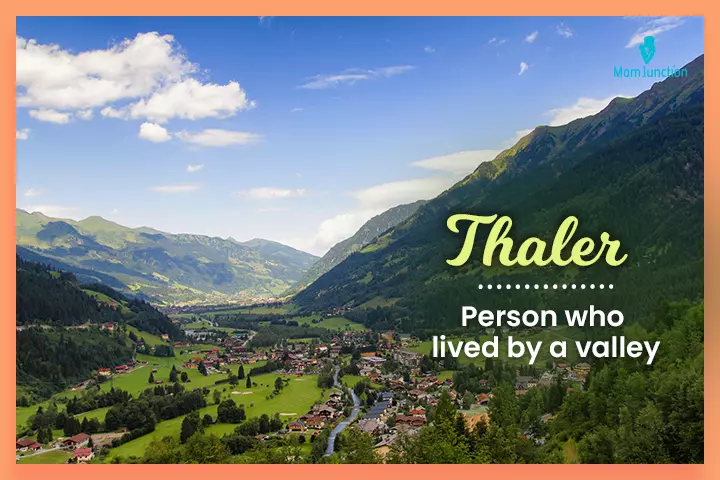
Image: Momjunction Design Team
Tal means valley, hence, Thaler could be a habitational surname referring to a person who lived by a valley.
61. Unger
In German, Unger is the ethnic title for a Hungarian national. It is also considered a nickname for those who have trade relations with Hungarians.
62. Wagner
It is a surname indicating the occupation of a ‘wagon maker’ or ‘cartwright.’ In Dutch, it is derived from waghenaer, meaning ‘carter.’ Renowned composer Wilhelm Richard Wagner was known for his operas across the world.
63. Zauner
An occupational title for indicating a fence maker. Zauner signifies the protective fence around a village or any region.
Popular Austrian Last Names
Some Austrian last names are relatively well-recognized across the world because of their popularity. Here are some most popular Austrian surnames.
64. Hinterberger
In German, hinter means ‘behind,’ while the surname Berger means ‘a person living on a mountain or hill.’ So, Hinterberger could be a toponym for ‘a person living behind a mountain or hill.’
65. Krenn
Indicating the act of ‘flowing’ or ‘running,’ Krenn could be an occupational surname associated with those who made drainage channels and gutters.
66. Lackner
It could be a surname indicating a person who hailed from the place called Lacken, Germany.
67. Lang
In German, Lang means ‘tall,’ while in Hungarian, the surname means ‘flame.’ It was probably a surname used for tall people.
68. Lechner
It could be a topographic surname referring to people who lived near the Lech River in Austria.
69. Lehner
A status title refers to a ‘person who holds the land as a feudal tenant or vassal.’ It could have been a surname used to indicate a person’s ownership over land.
70. Leitner
A surname indicating place of habitation, it refers to a person who ‘lives on a mountain slope or the hillside.’
71. Maier
Derived from the German term mei(g)er, it means ‘manager’ or ‘administrator.’ In Latin, it means ‘head of a household,’ ‘greater,’ or ‘tenant farmer.’
72. Mair
An occupational surname derived from the Scottish maor meaning ‘officer,’ it refers to a bailiff or officer in charge of overlooking summonses and other legal matters.
73. Maurer
It means ‘wall builder,’ ‘one who builds with stone,’ or ‘a mason.’ It could be an occupational title for someone who worked in building walls and other structures.
74. Moser
Associated with a geographic location, it refers to ‘someone who dwells near a peat bog.’ Alternatively, mōs means food or vegetable in German; hence, it could be an occupational surname for a vegetable vendor.
75. Pichler
Derived from the Bavarian term Bühel, meaning ‘hill,’ it could be used to denote a ‘person from a farm.’
76. Reiter
A derivative of the word riute means ‘cleared land.’ Or an occupational title referring to a ‘mounted soldier or knight.’ This surname is found in several European countries, such as Czechia and Slovenia.
77. Schneider
Derived from the term schneiden, it means ‘tailor’ or ‘someone who cuts.’ In some languages, it could also mean ‘woodcutter.’ Former footballer Bernd Schneider is a famous namesake who is also known as ‘The White Brazilian’ for his exceptional free kicks and dribbling skills.
78. Schuster
An occupational surname adopted by ‘shoemaker’ or ‘cobbler.’ It is also a common surname in France, Czechia, and Slovakia.
79. Schwarz
Meaning ‘black,’ this surname could be used to denote a person with black hair or a dusky skin tone.
80. Seidl
It could be an occupational name for a person who made drinking vessels of wood. It is also considered a diminutive of Siegfried.
81. Stadler
Stadel means ‘barn’ in German. Stadler means ‘person who lives near a barn.’ It is a known surname in Poland, France, Hungary, Czechia, and Slovenia.
82. Strasser
Strasse means ‘street’ or ‘road’ in German. Strasser refers to ‘a person living by a street or the country road.’
83. Wallner
A variant of the surname Waldner, it is a habitational title for ‘someone who lives in the forest.’ It could also be used for the forest warden.
84. Weber
An occupational surname referring to a ‘weaver.’ Weber is also a known title in various parts of Europe, such as France, Netherlands, Poland, and Hungary.
85. Weiss
It means ‘white’ and was likely to be adopted as a surname by someone who had white hair or an extremely pale skin tone.
86. Wieser
Wieser could be a habitational surname referring to someone who hailed from Wiesen. Alternatively, it could also mean ‘owner of a meadow’ inspired by the German term wiese, means ‘meadow.’
87. Wimmer
Associated with an occupation, Wimmer means ‘winemaker.’ As a surname, it could also be used by people who looked after the vines in a vineyard or guarded church property.
88. Winkler
The term winkel means ‘corner.’ Winkler could mean a ‘person who lived in a corner’ or ‘person who worked on a corner of land.’
89. Winter
Derived from the Old German term wintar, it means the season of ‘winter.’ It is also believed to be derived from the term vinter, meaning ‘wine merchant.’
90. Wolf
As the name suggests, it refers to the animal ‘wolf.’ It could be a topographic last name for someone who lived in a house identified with the sign of a wolf.
 Did you know?
Did you know?Unique Austrian Surnames
Some Austrian last names have a unique sound or spelling. Check out the surnames that stand out for their distinctiveness.
91. Augustin
This surname is derived from the personal name Augustin, which means ‘venerable’ or ‘great.’
92. Buchberger
A surname based on location that could refer to someone from the place called Buchberg.
93. Dobler
Dobler could be a last name for people who belonged to places named Dobel or Döbel.
94. Engel

Image: Momjunction Design Team
It is a diminutive of surnames starting with Engel- such as Engelbert and Engelhard. In Jewish, it means ‘angel.’
95. Frey
The Austrian last name Frey means ‘free’ or ‘independent.’ It could be a surname used to indicate a free man. It is also a title used for the worshippers of the Norse God, Frey.
96. Hufnagel
It means ‘hoof nail’ and could have been used as an occupational title for a farrier. This surname is also known in Germany, Hungary, and the US.
97. Hummer
In German, Hummer means ‘lobster.’ It could also be a variant of Huemmer, which is a habitational surname referring to a person from Hümme, Germany.
98. Kasper
Derived from the Latin Gaspar, which comes from the Hebrew gizbar, it means ‘treasurer.’ It is a known surname in Germany, Denmark, and Poland.
99. Klammer
A topographic title, Klammer means ‘a person living in or near a gorge.’ Apart from Austria, it is also a known surname in France and Romania.
100. Kohler
Kohler is an occupational name that means ‘charcoal burner’ or ‘charcoal seller.’ American actor Fredrick Louis Kohler is a popular namesake mostly known for playing negative roles.
101. Koppensteiner
A surname with a unique meaning. Koppensteiner means ‘crow on top of the stone.’ Austrian athlete Jeanette Koppensteiner is known for winning multiple awards in Luge tournaments across the world.
102. Lukas
Derived from the given name Lucas, the surname Lukas means ‘man from Lucania.’ In Italian, it means ‘shining’ or ‘bright.’
103. Muhr
Derived from the German term muir, meaning ‘marsh bog,’ Muhr is a surname given to a ‘person who lives at the marshland or moor.’
104. Neumayer
A variant of Neumeyer, this surname is composed of the German words nieuwe, meaning ‘new’, and Meier, meaning ‘steward or tenant or farmer.’
105. Paar
In Austria, Paar is the family name of a famous noble family. It means ‘house of a priest.’ This surname is also common in Czechia, Croatia, and Slovenia.
106. Pfleger
A surname primarily assigned to a legal guardian, it means ‘to supervise’ or ‘to administrate.’ In the medieval period, it was a title given to a person who held an official position in the Holy Roman Empire.
107. Reich
Derived from the German rihhi, it means ‘wealthy’ or ‘mighty.’ It could also be inspired by the term rīch, indicating a person of ‘noble lineage.’
108. Rieser
It is a habitational name indicating ‘someone who lives in Ries near Passau.’ It could also be derived from the German term reisære, meaning a ‘a warrior or a traveler who travels on a horseback.’
109. Rotter
Rotte is a German term that means ‘team’ or ‘gang.’ The surname Rotter is an occupational name that means ‘leader of a team, gang, or group.’ It could also refer to a person who comes from any of the places that are named Rott.
110. Schmaltz
A variant of the surname Schmalz, it is an occupational name given for a chandler. Chess grandmaster Roland Schmaltz is known for being the top player in bullet chess.
111. Tischler
An occupational title derived from the German word tisch, meaning ‘table.’ It refers to a person who makes cabinets.
112. Zamloch
Derived from the Czech word žemle, meaning ‘bread roll.’ It may have been an occupational surname given to bakers.
Rare Austrian Last Names
Old Austrian surnames seem to have become rare in the modern world. Here are some uncommon Austrian surnames.
113. Haushofer
An occupational title refers to ‘a person who works or manages a farmhouse.’ Austrian author Marlen Haushofer is a notable namesake known for her novel ‘The Wall.’
114. Lettner
It is derived from the German term for lette, meaning ‘clay soil.’ It could be used as a surname for someone who lives near or on clay soil.
115. Pfeffer
It means ‘pepper.’ As a surname, it could have been used for the spice seller. It is also believed to be a nickname for someone with a hot temper.
116. Schmetterling
This surname means ‘butterfly.’ This surname may have existed in the 18th century when German people believed butterflies consumed their milk products.
117. Schönberg
A descriptive surname, it refers to a ‘beautiful mountain.’ Renowned composer Arnold Schoenberg is a popular namesake from Austria. He was considered one of the most prominent composers of the 20th century.
118. Schorgl
A surname mostly associated with farmers, it means ‘lover of the land.’ It is also written as Schörgl.
119. Silberstein
Silberstein means ‘silverstone stone.’ It comprises the German terms silber, meaning ‘silver’, and stein, meaning ‘stone.’ It is also a habitational name for people from Silberstein, Bavaria.
120. Springer
Derived from the high German term springen, meaning to ‘leap’ or ‘jump.’ This could be a surname for a lively person or a professional entertainer. American journalist and host Jerry Springer is a popular namesake.
121. Stelzer
It means ‘a person with a wooden leg.’ This surname could also be associated with artists who entertained people by walking on stilts. It could also be a toponymic for a person who came from Stelzen.
122. Stern

Image: Momjunction Design Team
In German, Stern means ‘star.’ It could have been a name for a house or inn that was identified with a star sign on it.
123. Sternberg
Sternberg means ‘star mountain.’ American pole vaulter Brian Sternberg is known for being the former world record holder in men’s pole vault.
124. Strauss
It means ‘ostrich’ in German. It could have been a surname that identified a house that held the sign of an ostrich. It could have also been derived from strūz meaning ‘quarrel’ or ‘complaint’. The man who revolutionized jeans, Levi Strauss is a popular namesake.
125. Swoboda
Of Czech origin, this surname means ‘liberty’ or ‘freedom.’ It was probably a surname used for men or independent farmers who were free and not a serf.
126. Wolfram
Wolfram means ‘wolf raven.’ It combines two terms, wolf, meaning ‘wolf’, and the Norse term hrafn, meaning ‘raven.’
Old and Rich Austrian Last Names
Certain Austrian family names were associated with the rich and noble families of the olden times. Let’s have a look at them.
127. Arnstein
It means ‘eagle’s stone.’ It comprises two German terms: arn, meaning eagle, and stein, meaning stone. Arnstein is also considered a toponymic name, indicating a person from Arnstein, Bavaria.
128. Auspitz
It could be a toponym for someone from the Hustopeče (known as Auspitz in German) town in Moravia.
129. Eskeles
It could be a toponym for someone from Elkesh, also known as Olkusz in the Krakow province, Poland. Apart from Austria, this surname is also found in Germany and Poland.
130. Goldschmidt
As apparent from the surname, it is an occupational surname for a ‘goldsmith.’ Professional baseball player Paul Goldschmidt is a popular namesake for bagging numerous awards.
131. Gomperz
It means ‘war bright.’ In use since the 14th century, this surname is derived from the Old German surname Gundbert.
132. Habsburg
It means ‘hawk castle.’ House of Habsburg is considered one of the most respected dynasties in European history. This surname is associated with the members belonging to this family.
133. Lieben
In German, lieben means ‘love.’ This surname could mean ‘beloved’ or a ‘loved one.’ This surname is also known in Switzerland and Eastern Europe.
134. Rothschild
Composed of the German terms rot, meaning ‘red’ and Schilt, meaning ‘shield,’ Rothschild, means ‘a red shield.’
135. Schlosser
It means ‘locksmith.’ It is derived from the German term sloz, which means ‘lock.’ It could also be an occupational surname indicating a person employed at a castle.
Cool Austrian Last Names
Certain Austrian surnames are considered cool for many reasons, such as their meaning, association with famous personalities, or modern-day relevance.
136. Brandstätter
It means ‘a place cleared by burning.’ It is also a toponymic for a person from any place with a similar spelling, such as Brandstatt, Brandstädt, or Brandstätt.
137. Eisner
Based on a person’s profession, this surname means ‘ironer,’ ‘ironworker,’ or ‘smith’ as it is derived from the German term Eisen, meaning ‘iron.’
138. Löwenstein
It could be a habitational name based on the city of Löwenstein in Germany. Alternatively, it could also mean ‘lion stone,’ as it is composed of German terms, Löwe and Stein, meaning ‘lion’ and ‘stone,’ respectively.
139. Schön
Schön means ‘beautiful,’ ‘friendly,’ or ‘nice.’ It could be an occupational surname for someone who deals in shoes as it could be derived from the Dutch word schoen, meaning ‘shoe.’
140. Schwab
It is a toponymic surname for a person who belonged to the region of Swabia in Germany. American author Victoria Elizabeth Schwab is a popular name bearer known for her children’s and young adult fiction novels.
141. Tauber
It means ‘pigeon’ or ‘dove.’ This could be an occupational title for a person who breeds pigeons.
142. Weissmann
Meaning ‘white man’ or ‘fair man.’ This surname may have been used for someone with white or pale skin.
143. Zellweger
It could be a habitational name meaning ‘person who lives on Zelle road.’ American actress Renée Zellweger is a popular name bearer known for her laudable performances in numerous Hollywood movies.
Long Austrian Last Names
Austrian surnames can be extended. Let’s check out some of the longest Austrian surnames.
144. Brandstetter
It is a surname signifying a person coming from a place called Brandstatt or Brandstädt or Brandstätt.
145. Kerschbaumer
In German, kirschen refers to ‘cherries’ and baum indicates a ‘tree.’ Kerschbaumer could be a surname based on the local tree, i.e. cherry tree in their area.
146. Mayerhofer
Mayerhof (or Meierhof) is the name of a place in Bavaria. Mayerhof could be a surname used for a person from Mayerhof.
147. Schechinger
It could be a habitational name signifying a person’s connection to the town of Schechingen near Schwäbisch-Gmünd, Germany.
148. Steinberger

Image: Shutterstock
It is likely to be a habitational name for someone who hails from any of the places named Steinberg. It could also mean ‘stone mountain.’
149. Steininger
A habitational surname indicating a person who hailed from Steiningen in the Rhineland or Steining in Bavaria.
150. Wiesenthal
It comprises German terms wiese, meaning ‘meadow’ and tal, meaning ‘valley.’ It could also be a habitational name for a person who belongs to Wiesent, Bavaria.
151. Zimmermann
It is an occupational name for a carpenter. It comprises two terms zimber meaning ‘timber wood’ and man meaning ‘man.’
Discover More Names
When you have to choose a name for your baby, a few hundreds of names may not be just enough. Keep digging our mine of baby names until you find that one precious gem.
Frequently Asked Questions
1. How do Austrian last names work?
In Austria, surnames are hereditary and passed down from generation to generation. These last names are primarily based on occupation, geographic location, and social status. The surname would also be patronymic based on the father’s name or description of a person’s physical features.
2. Can you have two surnames in Austria?
When a woman marries, she can retain her maiden name and use her partner’s surname, attaching it with a hyphen. For instance, Anna Mia Müller-Reich.
3. Can you change your last name in Austria?
A person can change their surname only if the surname of their parent or parents changes due to a change in their marital status, re-adoption of a former surname, or name change. Citizens can also opt for a name change if their family name is considered difficult to pronounce, weird, or offensive (5).
4. What are some unique characteristics of Austrian surnames compared to German surnames?
Austrian surnames often end with the “–er” suffix, a common Germanic suffix but particularly prevalent in Austria. Moreover, Austrian noble surnames often include “von,” but they may also include the rarer “zu” (meaning “to,” indicating ownership of an estate). Austrian German dialects also sometimes shorten Austrian surnames or reflect specific regional pronunciations.
5. Who are some famous people with Austrian surnames?
Josef Strauss, Fritz Lang, Otto Wagner, and Anton Bruckner are a few famous people in the fields of music, films, and architecture bearing Austrian surnames.
From the countryside’s picturesque hills to Vienna’s bustling streets, Austrian surnames connect the present to its past. They share their struggles, resilience, successes, and failures. Some surnames are rooted in nobility, while some exhibit the humble beginnings of regular Austrian folks. Some surnames have traveled the world, while others have held tight to their roots. Some surnames have been around for centuries, while some have emerged recently. Exploring these surnames will help one understand the heritage of the country and its unique identity.
Infographic: 8 Most Popular Occupational Surnames In Austria
Like any other country, traditional Austrian surnames were also created to reflect certain peculiar aspects attached to a family. Occupational surnames in Austria give a glimpse into the professions prevalent in the olden days. Check out the infographic below to know which old occupational surnames have become popular even in modern times.
Some thing wrong with infographic shortcode. please verify shortcode syntaxReferences
- Languages culture and religion.
https://www.migration.gv.at/en/living-and-working-in-austria/austria-at-a-glance/languages-culture-and-religion/ - Gruber Mountains.
https://data.aad.gov.au/aadc/gaz/display_name.cfm?gaz_id=125990 - A piece of history: German surnames.
https://www.alumniportal-deutschland.org/en/magazine/germany/german-surnames/ - The German Confederation in 1858.
https://ww1.odu.edu/content/dam/odu/offices/mun/2025/german-confederation.pdf - Name change.
https://villach.at/stadt-service/persoenliche-dokumente/namensaenderungen?lang=en-us
Explore Austrian Surname Origins & Meanings
Watch this video to explore Austrian surname origins, meanings, and naming traditions. Dive in and learn how common prefixes and last names reflect Austria’s rich cultural heritage. Watch now!
Community Experiences
Join the conversation and become a part of our nurturing community! Share your stories, experiences, and insights to connect with fellow parents.
Read full bio of Ratika Pai
Read full bio of Rebecca Malachi
Read full bio of Shinta Liz Sunny







